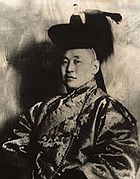- Noyan
-
For other uses, see Noyan (disambiguation).
Noyan, noyon (and some other spellings introduced via Arabic texts; Mongolian: ноён) was a title of authority in the Mongol Empire and later periods. In modern Mongolian the word is used as a form of address similar to "Mister" or "Monsieur".
 Tögs-Ochiryn Namnansüren, also called "Good Noyan Khan Namnansuren" in the Mongolian language
Tögs-Ochiryn Namnansüren, also called "Good Noyan Khan Namnansuren" in the Mongolian language
Initially, it was a term for a military commander in the army of Genghis Khan: the term noyon applied to commanders of tumens and minghans, military units of 10,000 soldiers and 1000 soldiers respectively. During conquests, noyons used to receive territories for administration and they effectively became Mongolian aristocracy, which existed until the 20th century. Noyans were above the ordinary Mongols in social rank but below the descendants of Genghis and his brothers. They were sometimes called emir or bey in the Ulus of Jochi, the Ilkhanate and the Chagatai Khanate while the Yuan records gave the equivalent as guanren since their main task was waging warfare.
Usually notable persons are referred to with the addition of "Noyan" after the ordinary personal name, similarly to the usage of the title "Khan", e.g., Jebe Noyan, Chormaqan Noyan, Sali Noyan, Karik Noyan and so on.
After the Mongol Empire
The Qing Dynasty, which ruled Mongolia from 1694 to 1911, entrusted rule in Mongolia to the descendants of Genghis Khan, who were thus called noyan. The term noyan in this epoch acquired the connotation of nobleman since Mongolia was mostly at peace. After 1921 the word darga (boss) replaced the aristocratic noyan as the term for officials.[1]
Notes
- ^ C.P.Atwood-Encyclopedia of Mongolia, p.412
See also
Northern Yuan Dynasty (1368–1635) Political organization Emperors Terms and prominent people - Six Tumen Mongols
- Three Eastern Tumens
- Three Western Tumens
- Ordos
- Tümed
- Yungshiyebu
- Four Tumen Oirats
- Choros
- Torghud
- Khoid
- Dorbed
Notable cities
- Ukhaantu Khan Toghun-Temur (1333–1370)
- Biligtü Khan Ayushiridara (1370–1378)
- Uskhal Khan Tögüs Temür (1378–1388)
- Jorightu Khan Yesüder (1388–1392)?
- Engke Khan (?–1392)
- Elbeg Nigülesügchi Khan (1392–1399)
- Gün Temür Khan (1400–1402)
- Örüg Temür Khan Gulichi (1402–1408)
- Öljei Temür Khan Bunyashiri (1403–1412)
- Delbeg Khan (1415)
- Oyiradai Khan (1415–1425)
- Adai Khan (1425–1438)
- Tayisung Khan Toghtoa Bukha (1433–1452)
- Agbarjin (1453)
- Esen Tayisi (1453–1454)
- Markörgis Khan (Ükegtü) (1454–1465)
- Mulan Khan (1465–1466)
- Manduulun Khan (1475–1478)
- Dayan Khan (1478–1516)
- Bars Bolud Jinong (deputy)
- Bodi Alagh Khan (1516–1547)
- Darayisung Gödeng Khan (1547–1557)
- Tümen Jasaghtu Khan (1557–1592)
- Buyan Sechen Khan (1592–1603)
- Ligden Khan (1604–1634)
- Ejei Khan (1634–1635)
Prominent politicians and generals
- Köke Temür
- Arugtai
- Bahamu
- Toghan taishi
- Gulichi
- Bek Arslan
- Unebolad wang
- Altan Khan
Categories:- Military history of the Mongol Empire
- Positions of authority
- Men's social titles
- Military history stubs
Wikimedia Foundation. 2010.
